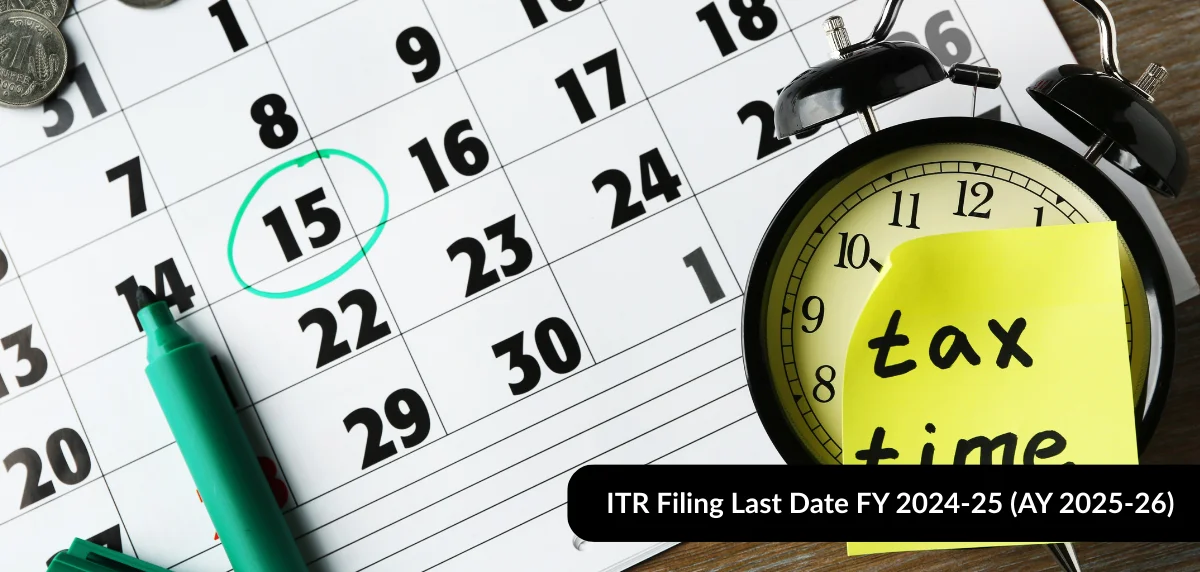Income tax is the amount you pay to the government on the income you earn in a financial year. You can carry out this responsibility by filing your Income Tax Return (ITR) on time. So, what is an Income Tax Return? It is a way to declare your earnings, deductions, and taxes paid. For FY 2024-25 (AY 2025-26), the government has extended the income tax return filing last date to give taxpayers more time to comply. Knowing the exact ITR filing last date helps avoid penalties and interest charges while ensuring smooth compliance.
Last Date for Filing ITR for FY 2024-25
The Central Board of Direct Taxes (CBDT) has extended the Income Tax Return last date for non-audit taxpayers such as individuals, HUFs, AOPs, and BOIs. Instead of 31st July 2025, the ITR last date has been extended to 15th September 2025.
Here’s a quick breakdown:
- Individual / HUF / AOP / BOI (no audit required): 15th September 2025
- Businesses requiring audit: 31st October 2025
- Businesses requiring transfer pricing reports: 30th November 2025
- Revised or Belated Return: 31st December 2025
- Updated Return: Till 31st March 2030
Missing the IT return file last date could lead to several consequences, such as penalties under Section 234F, interest under Section 234A, and loss of carry-forward benefits for business or capital losses.
How to File ITR Online?
If you are wondering how to file ITR, here are the steps to follow:
Step 1. Log in to the Income Tax Portal
Use your PAN and password to access your account.
Step 2. Select the Assessment Year
Choose AY 2025-26 if you are carrying out income tax e-filing for FY 2024-25.
Step 3. Choose Filing Status
Select whether you belong to the Individual, HUF, or other applicable category.
Step 4. Select Correct ITR Form
There are seven types of ITR forms, with each being applicable for different taxpaying entities. While ITR-1 and ITR-2 are the usual choices for salaried professionals, firms and companies can choose from ITR-5 and ITR-6.
Step 5. Specify Reason for Filing
You can specify a valid reason for tax-filing. For instance, you can select that your taxable income is more than the exemption limit or meets the mandatory filing criteria.
Step 6. Fill in Details
Verify pre-filled data such as PAN, Aadhaar, salary, and bank details. Add income, deductions, and exemptions.
Step 7. Validate & Submit
Review the return summary, pay any balance tax, and confirm submission.
Step 8. E-Verify the ITR
You must complete your verification within 30 days of carrying out your income tax e-filing via Aadhaar OTP, EVC, net banking, or by posting the ITR-V to CPC, Bengaluru.
Tip: Use an income tax calculator before filing to estimate liability under the old and new income tax slab systems.
What Happens if You Miss the ITR Filing Due Date?
Filing your income tax return within the prescribed time frame is very important. If you miss the ITR filing last date, the Income Tax Department imposes certain penalties and restrictions that can directly affect your finances.
Late Filing Fee (Section 234F)
If your total income is above ₹5 lakh, you may have to pay a late filing fee of ₹5,000. If your income is below ₹5 lakh, the penalty is reduced to ₹1,000.
Interest on Outstanding Tax (Section 234A)
When you miss the income tax return last date, any unpaid tax attracts interest at the rate of 1% per month or part thereof until the tax is cleared. This means even a small delay can increase your tax outgo.
Loss of Carry-Forward Benefits
If you have a business loss, capital loss, or loss from house property, you cannot carry these forward to future years unless you file your return on time. This can increase your tax liability in the coming years.
Other Consequences
Banks, financial institutions, and embassies often require proof of income through ITR acknowledgements. Missing the last day to file taxes may affect your chances of getting loans, credit cards, or even visas.
In short, filing your return before the ITR last date ensures peace of mind, avoids penalties, and keeps you financially compliant.
Can You File ITR after the Due Date?
Yes, you can still file after the income tax return filing last date by submitting a belated return under Section 139(4). For FY 2024-25, you can file belated returns until 31st December 2025. However, late fees and interest apply.
Additionally, if you miss this last day to file taxes as well, you still have the option to file an Updated Return (ITR-U) within 4 years from the end of the relevant AY, i.e., till 31st March 2030 for AY 2025-26.
Filing a Revised ITR in Case of Errors
If you file your return but later discover mistakes, such as missed deductions, wrong income details, or incorrect bank information, you can file a revised ITR.
Deadline for Revised ITR: 31st December 2025 for AY 2025-26.
Example
Mr Saksham filed his return on 30th June 2025, but forgot to claim Section 80C deductions. He can revise his return any time before 31st December 2025.
Revising one’s ITR can ensure compliance and more accuracy. Filing a revised return is also part of responsible income taxation and helps avoid notices from the Income Tax Department.
Should You File ITR Even When Your Income is Below the Exemption Limit?
Ideally, one must file an Income Tax Return (ITR) if their income exceeds the basic exemption limit set under the income tax slab.
- It is recommended to file ITR even if your income is below the basic exemption limit, as it can still be highly beneficial. If tax has been deducted at source (TDS) by your employer or bank, you can claim a refund only by filing your return.
- An ITR acts as valid proof of income and financial responsibility. This document is often required by banks when you apply for loans or credit cards and by embassies when applying for visas.
- Filing regularly, even when not mandatory, builds a clear financial record and makes future compliance easier.
To sum up, timely filing of your ITR ensures compliance with tax rules and offers peace of mind. For FY 2024-25 (AY 2025-26), the extended last date to file IT returns is 15th September 2025 for individuals not requiring an audit. Using an income tax calculator can simplify the process. Whether it is filing on time, revising errors, or using deductions, being aware of deadlines is key to managing taxes smoothly and responsibly.
























